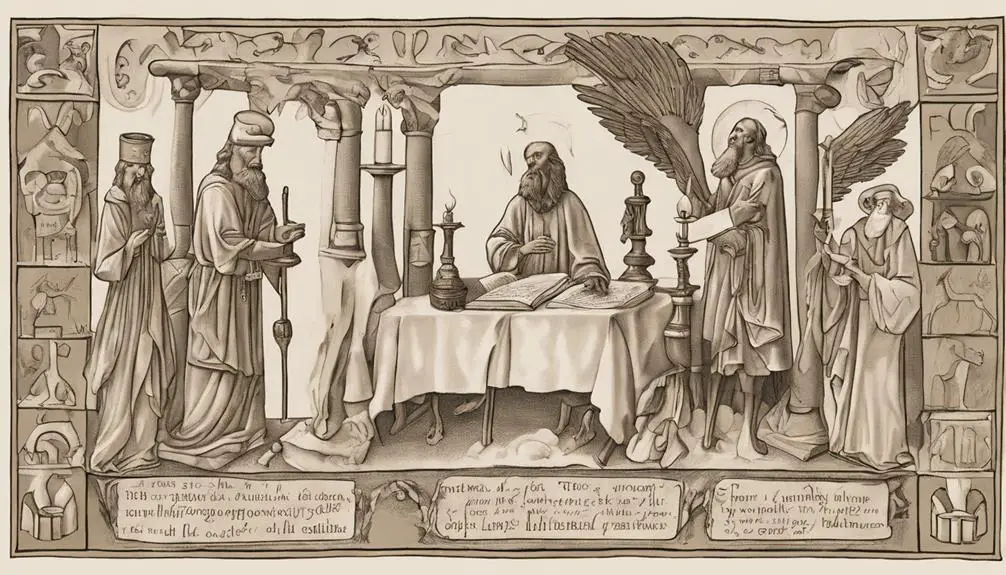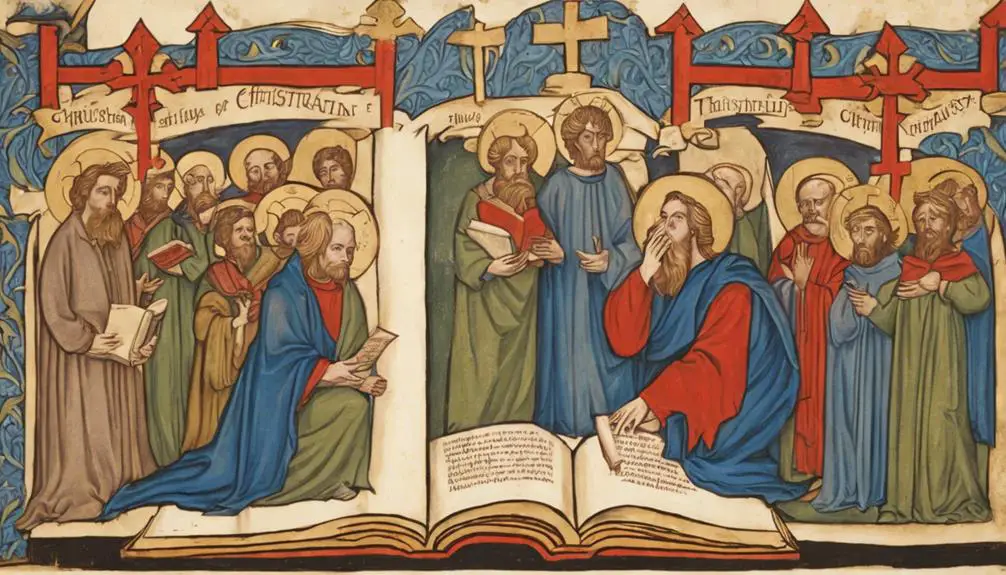Immerse yourself in an in-depth exploration of John's biblical role, unraveling his teachings, visions, and profound impact on Christianity.

A Study of John in the Bible
Imagine yourself walking alongside John, navigating through the bustling streets of ancient Jerusalem. You've heard his teachings and witnessed his profound impact on Christianity, but do you truly understand the depth and complexity of his biblical presence?
In our study, we'll unravel the layers of his teachings, explore the intricacies of his visions, and question the ripple effects of his influence.
The journey to comprehending John's role in the Bible is long and winding, yet the insights you'll gain along the way promise to be invaluable. Are you ready to begin this exploration?
Key Takeaways
- John's role as an apostle and attributed author significantly shaped the New Testament and early Christian theology.
- His teachings emphasize the divinity of Christ, love, faith, and use metaphoric language for effective understanding.
- John's book of Revelation provides prophetic visions filled with unique symbols, requiring interpretation for a comprehensive understanding.
- John's influence extends to core Christian beliefs, ethics, sacraments, eschatology, and personal faith experiences.
John's Role in the New Testament

Delving into John's role in the New Testament, you'll find his contributions pivotal, influencing not just the narrative arc of the text, but also shaping the theological underpinnings of early Christian thought. As one of the original twelve apostles, he played a significant role in the formative years of Christianity. Known as the 'Beloved Disciple', his prominent position is evident throughout the Gospels. You'll notice his presence at key events, such as the Transfiguration and the Last Supper, illustrating his integral role in Jesus' inner circle.
John's influence doesn't stop there. As the attributed author of the Gospel of John, three Epistles, and the Revelation, his writings form a crucial part of the New Testament canon. His Gospel, distinct from the Synoptic Gospels, offers a unique perspective on Jesus' life and teachings. It's from John's pen that significant theological concepts such as the Word (Logos) and the Holy Spirit's role are first elaborated in detail. In essence, John's role in the New Testament isn't just as a character or witness, but as a key architect in formulating and articulating early Christian theology.
Understanding John's Teachings

Grasping the depth of John's teachings requires a close examination of his written works, where you'll find profound spiritual insights woven into narratives and parables. As you delve into his Gospel, you'll encounter an emphasis on love, light, and life, which are the cornerstones of his message. John's teachings are deeply rooted in the concept of agape love, the self-sacrificial love that Christ demonstrated.
You'll find John's teachings fall into two main categories: theological and ethical. His theological teachings, full of depth and complexity, focus on the divinity of Christ. John affirms Jesus' divine status, stating Jesus is the Word made flesh. His ethical teachings, on the other hand, underscore the importance of love and faith.
His writings also express a high Christology, treating Jesus as the preexistent Logos and the unique Son of God. You'll notice that John uses metaphoric language, like 'light of the world' and 'bread of life', to describe Jesus, thereby enhancing the spiritual significance of his teachings. Remember, understanding John's teachings isn't about mere intellectual comprehension. It's about letting the message transform you, shaping your worldview and guiding your actions.
Analysis of John's Revelations

To analyze John's Revelations, you'll need to venture into a realm filled with symbolic imagery and prophetic visions, as these form the crux of this apocalyptic text. A deep dive into this text reveals a complex layer of metaphors and symbolism, each with its unique significance.
You can start by dissecting the four primary symbols John uses throughout the text. Let's consider a table to illustrate:
Symbol |
Significance |
|---|---|
Seven Churches |
Represents the universal church and its varied states |
Four Horsemen |
Symbolizes the different types of judgments |
The Beast |
Depicts a powerful, evil entity, often considered as Antichrist |
The Lamb |
Represents Jesus and His sacrificial role |
Understanding these symbols gives you a framework to interpret John's narrative. For instance, the seven churches not just signify seven historical churches of Asia Minor, but also the entire Christian church in its different spiritual states.
John's Influence on Christianity

After dissecting the symbolic imagery in John's Revelations, you'll begin to appreciate the profound influence John has had on Christianity. His writings aren't merely historical records; they've become bedrock doctrines shaping the faith's core beliefs.
John's perspective of Jesus as the incarnate Word of God, for instance, has been instrumental in defining the divinity of Christ, a cornerstone of Christian theology. His emphasis on love as a divine mandate has influenced Christian ethics and social teachings, making love a hallmark of Christian identity. You can't overlook his role in establishing the sacrament of the Eucharist, either. His account of Jesus' Last Supper, where Christ says, 'This is my body' and 'This is my blood,' has shaped the sacramental understanding of Christians worldwide.
Moreover, John's eschatological views, although not to be discussed here, have also significantly impacted Christian thought on end times. Lastly, John's emphasis on personal experience with God has encouraged a more intimate, individualistic approach to faith. This has nurtured the growth of various Christian spiritualities. So, John's influence extends far beyond the pages of his writings, permeating the very heart of Christian belief and practice.
Interpretations of John's Visions

Diving into the interpretations of John's visions offers a rich exploration of symbolic language and imagery that have baffled scholars and theologians for centuries. You'll find that the visions, as described in the Book of Revelation, are multi-layered and complex, open to a multitude of interpretations.
Firstly, you'll encounter the Preterist perspective, which suggests that John's visions primarily referred to events of his own time, particularly the oppression of Christians under the Roman Empire. They'd argue that phrases like 'the great city' are symbolic of Rome, and the tribulations predicted are those experienced by early Christians.
Next, you'll come across Futurist interpretations. These argue that John's visions are prophetic, foretelling events that are yet to occur. This perspective often ties into End Times theology, suggesting a coming apocalypse and final judgement.
Lastly, the Idealist or Symbolic view proposes that the visions aren't tied to specific historical events, but rather symbolize the ongoing spiritual struggle between good and evil.
Conclusion
In scrutinizing John's role, teachings, and revelations, you've gained a profound understanding of his impact on Christianity. His visionary interpretations have shaped religious thought and continue to evoke deep analysis.
By studying John, you comprehend not only the theological complexities of his writings but also the profound influence they hold. Thus, John in the Bible stands as a pivotal figure, his teachings fostering enduring theological discussions and interpretations.



Sign up